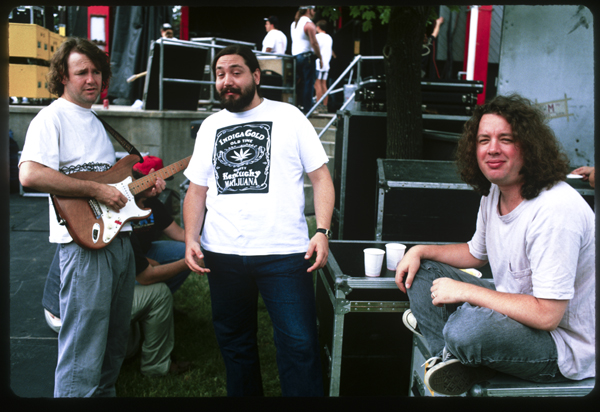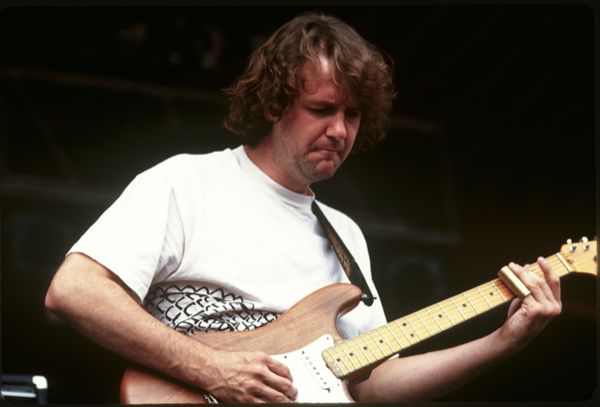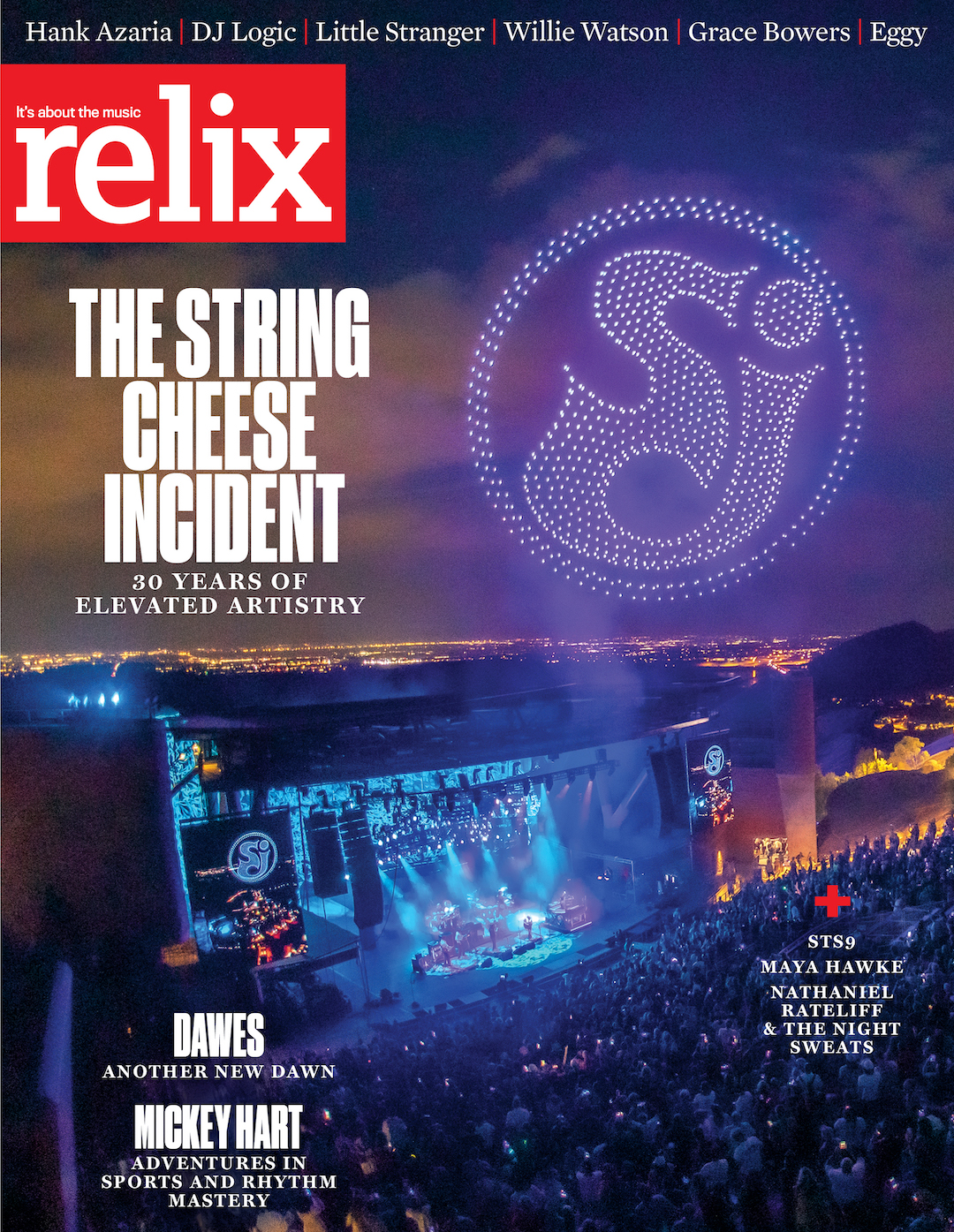H.O.R.D.E. Stories: John Bell
The current issue of Relix looks back 20 years to the inaugural H.O.R.D.E. tour in 1992 which featured Blues Traveler, Phish, Widespread Panic, Spin Doctors, Col. Bruce Hampton and Aquarium Rescue Unit and Bela Fleck & The Flecktones. Here are Widespread Panic frontman John Bell’s memories of the 1992 tour. To view all of our special H.O.R.D.E. content, which we will post over the coming weeks, visit www.relix.com/HORDE .

On the origins of H.O.R.D.E.
We were having the idea simultaneously because we were swapping gigs with Phish and Blues Traveler. Then all of a sudden we knew we were going to be on the road that summer and we wanted to do some of these big venues and get a little happening going, so we all could be working as one force. The bottom line was we knew that was potential for a lot of fun for everybody to get together.
The initial meeting of musicians
I remember no management was the rule. We wanted to be there looking at each other and be in agreement that this is what we wanted to do and then hand it over to management, “Okay this is what we want to do these are the parameters. Let’s make it happen.” Unless you’re going to stick in your own room or your own apartment and you’re not going to play out, that’s the only way for the music business not to come in and affect the operation. We had a golden moment there.
That meeting up in New York was a gas. I’d never seen that before. Everything else now is promoters, agents, managers. They cook up the scenarios or you just fit yourself into something like Jazz Fest or Bonnaroo, which is great, it’s well-organized and put together. But we’d been playing with each other for the past couple years opening for each other in different territories and this was young band guys getting together and having their own ideas of what was going on. It wasn’t coming from the management, so it was really hip.
And it was a nice adventure especially going up there with Col. Bruce. We discussed a lot of stuff and how we were going to handle it that was all very vague and tongue in cheek and then Mike Gordon brought out a jar of Vaseline and we all shook hands after ceremoniously dipping our hands in the Vaseline. That was our first little peek into Mike Gordon’s soul.
*A Rolling Stone article about the initial meeting published prior to the tour described Bell as “drinking Dewar’s out of a measuring cup.” *
My old man read the article and said, “Jesus Johnny, what’s going on there?” And I’m like, “Dad there were no glasses, I really wasn’t in the mood to pass the bottle around. I found the measuring cup and you could think of this in the terms that I was drinking responsibly.”
There was some push back from management regarding the participation of Aquarium Rescue Unit which was the least well-known of the groups.
The beauty of being in a band is you have some lofty ideas but then when you throw them into that pit of reality that some stuff’s going to pop up. I remember some questions coming up, " Who are these guys? They’re not going to draw tickets." And I remember there was a collective statement from Popper, Trey and myself, “No, they’ve got to be on the tour, we’ve already decided.”
Bruce approached music and the whole way we apply ourselves on stage and with each other musically in a different way. And it really came at a good time where it would screw with everybody’s sense of self. At an early time in your career that’s a good thing and I think the band really embraced that. None of us were too entrenched in thinking we needed to be bigwigs. What Bruce was doing was adding a theater of the absurd but creating an environment that was a self-reminder of having good intentions when you go out there and playing with intention…and keeping your ears open and trying to keep your ego at bay, you’ve got enough members in the band.
It wasn’t like you were listening to songs, it was like all of a sudden you became immersed not only musically but visually. You’re hearing this music which is basically rock and roll format but it was turning into jazz that could go anywhere at any time and improvisation at its highest and the next thing you know Col. Bruce is body slamming Oteil the bass player and you go, “Wow that just happened but the music is still seamless…” You can’t do it unless it’s your inclination but those guys really were a presence that affected everybody in a very positive way I thought.

Aquarium Rescue Unit opened the shows in the northeast and then ended their sets with a segue into Widespread Panic, who performed second.
The most important element was you had two bands willing to do this. One drummer’s being wheeled on while the other one’s riser’s being wheeled off. And that we could jam together in an improvisational sense. At one point we’d be two full bands on stage and then slowly the band that was on stage previously, one by one they’d slip off and then it would be next band.
It really started because we saw an extra 15 minutes instead of doing the changeover. We saw the 15 minute window as an opportunity to do something different and continue to play and keep the music going. You really couldn’t do it unless you had the larger stage and a bunch of young crew members willing to go, “Whoah okay this is freaky, yeah let’s do it.” We wanted to stretch the usual parameters of normality in going to a concert and this was one way that just disappeared. The other bands and managers were wondering what the crap was going on. “Well you know, it’s our time…”
On overall intent
We were going to keep a low ticket price, hearkening back to my concert going days in the late 70s. You wanted to get people into these larger venues. We didn’t want it to be a bust, we wanted it to be a celebration. We accomplished what we set out to accomplish. We had lot of people in there. The bands created a festival situation.
It was early enough in our careers that nobody was trying to guard their territory or pee on any bushes. We were finding our personal enjoyment in the activity itself. It wasn’t career move as far as I was aware. It was trying to have a party.
The dressing rooms were nicer, catering was existent but the best element was that we as Widespread Panic were young enough to want to be out and involved and co-mingling with all the other musicians in a social way as well. Kind of like what you would see in some of movies of the ‘60s and ‘70s that were trying to document behind the scenes at rock and roll events. People were just getting together and spontaneously playing songs with each other, doing press together. And we were young enough that we weren’t trying to protect our personal time or anything. Everything was wide open.
Discovering The Flecktones
We were very familiar with Spin Doctors and Blues Traveler and Phish and obviously ARU. When we did the southern run with Bela Fleck and the Flecktones, we were like, "Holy crap, there are other bands that embrace this Aquarium Rescue Unit kind of mentality. To watch the Wootens, the combination of technical ability and improvisational and intuitive skills was just off the charts. It was great to be able to play your set and then watch this stuff go down. It felt really good.
Legacy
If you look into the future the legacy took hold with things like Bonnaroo. I give the Bonnaroo guys full credit for just knocking it out of the park right off the bat. I know what we were feeling when we were doing the H.O.R.D.E. that was embodied in the Bonnaroo situation. And there are a number of other festivals around the place that are cultivating the same vibe.



















